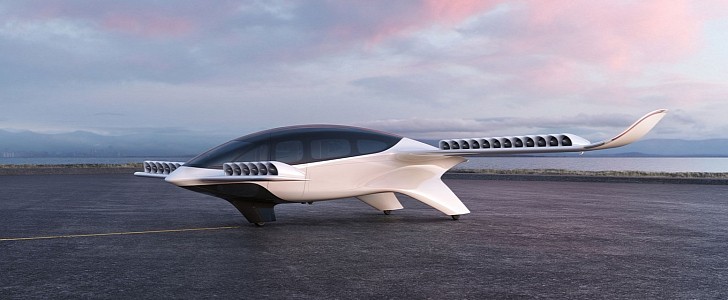With all the excitement around “flying cars” or eVTOLs (electric vertical takeoff and landing vehicles), we’re still some distance away from seeing one deployed in a smaller or larger passenger capacity. We only have to wait until 2024, according to Lilium.
Lilium, a German startup that’s been around for years, working diligently toward delivering the world’s first flying car and regional shuttle service, is the industry's latest company to go public. With the announcement of the merger with Qell Acquisition (founded by former General Motors executive Barry Engle), Lilium is also announcing a new eVTOL.
Previously, the company had been developing and testing the Lilium Jet, a 5-seater using 36 electric motors built in-house, traveling at speeds of up to 300 kph (186 mph) for a max range of 300 km (186 miles). The new eVTOL goes by the same name but is bigger, with a more pronounced emphasis on comfort and efficiency but, at least on paper, lower performance. The cruising speed is estimated at 282 kph (175 mph) and the range at 250 km (155 miles).
Nonetheless, the future is promising. The 7-seater will allow regional shuttle service to be sustainable and high-speed, “saving hours, not minutes.” The aircraft will be able to perform vertical takeoffs, which, in turn, will allow Lilium to build higher network density because expensive ground infrastructure won’t be necessary. Lilium already has several partnerships to build vertiports and vertiport hubs, including a first one in Florida, in the United States.
The new shuttle will be fast, efficient, noise, and emissions-free, and will place emphasis on comfort. The spacious cabin offers seating for six, with the pilot in a separate cabin and extra room for carry-ons. Lilium estimates that commercial operations could begin as early as 2024 but, we should note that it’s still pending certification with the Federal Aviation Administration (FAA) and the European Union Aviation Safety Agency (EASA).
“Our vision is to create a sustainable and accessible mode of high-speed travel and bring this to every community. Transport infrastructure is broken. It is costly in personal time, space consumption and carbon emissions,” Daniel Wiegand, Co-Founder and CEO of Lilium, says. “We are pursuing our unique electric jet technology because it is the key to higher-capacity aircraft, with lower cost per seat mile while delivering low noise and low emissions.”
Previously, the company had been developing and testing the Lilium Jet, a 5-seater using 36 electric motors built in-house, traveling at speeds of up to 300 kph (186 mph) for a max range of 300 km (186 miles). The new eVTOL goes by the same name but is bigger, with a more pronounced emphasis on comfort and efficiency but, at least on paper, lower performance. The cruising speed is estimated at 282 kph (175 mph) and the range at 250 km (155 miles).
Nonetheless, the future is promising. The 7-seater will allow regional shuttle service to be sustainable and high-speed, “saving hours, not minutes.” The aircraft will be able to perform vertical takeoffs, which, in turn, will allow Lilium to build higher network density because expensive ground infrastructure won’t be necessary. Lilium already has several partnerships to build vertiports and vertiport hubs, including a first one in Florida, in the United States.
The new shuttle will be fast, efficient, noise, and emissions-free, and will place emphasis on comfort. The spacious cabin offers seating for six, with the pilot in a separate cabin and extra room for carry-ons. Lilium estimates that commercial operations could begin as early as 2024 but, we should note that it’s still pending certification with the Federal Aviation Administration (FAA) and the European Union Aviation Safety Agency (EASA).
“Our vision is to create a sustainable and accessible mode of high-speed travel and bring this to every community. Transport infrastructure is broken. It is costly in personal time, space consumption and carbon emissions,” Daniel Wiegand, Co-Founder and CEO of Lilium, says. “We are pursuing our unique electric jet technology because it is the key to higher-capacity aircraft, with lower cost per seat mile while delivering low noise and low emissions.”






